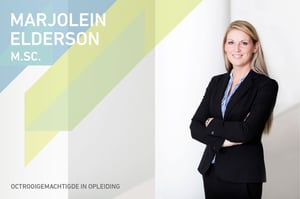Becoming a patent attorney: no walk in the park
 Trainee Patent Attorney Marjolein Elderson is in the first year of her course to become a Dutch patent attorney. By the time this BL&G is published she will have finished her first six months. She attends school with other technical graduates for two days every two weeks. If all goes well Marjolein will finish her Dutch course at the end of 2018 and her European one in 2020. What does the course involve? Marjolein explains.
Trainee Patent Attorney Marjolein Elderson is in the first year of her course to become a Dutch patent attorney. By the time this BL&G is published she will have finished her first six months. She attends school with other technical graduates for two days every two weeks. If all goes well Marjolein will finish her Dutch course at the end of 2018 and her European one in 2020. What does the course involve? Marjolein explains.
What subjects do you get in the first year?
In the first three months we did a crash course in Dutch law, which focused mainly on civil law. It looked at how the legal system is organised, how the legal regulations work and how Dutch law relates to, and correlates with, international law. In essence it covered the broader context within which you should place patent law.
The second block covered a lot of the theoretical aspects of Dutch and European patent law. It also paid attention to the practical skills required to draw up and defend a patent application. There is obviously some interaction between these.
How do you feel about the course for patent attorneys so far?
It's good! The lecturers are inspiring and have a strong personal vision. This enables you to discover how you wish to approach the profession yourself. There is room for questions during the lectures and you get an opportunity to engross yourself in topics that interest you.
What do you find difficult or disappointing about the course?
Organising my time. I am a bit of a perfectionist. It is a challenge to learn as effectively as possible with the feedback you receive. As patent attorneys tend to be perfectionists, I am definitely not alone in this! Delivering quality within a set time is a skill you need to master when engaged in this profession. It is great that I am able to get training during my course.
What do you enjoy most?
The practical assignments: learning to write patent applications. These assignments are assessed by a different lecturer each time. You are also given feedback in small groups. It is educational to look at the subject matter from various different angles.
How much time do you spend on the course each week?
Around 12 to 16 hours, generally in the weekend.
What do you find interesting about the patent attorney profession?
The fact that you have to engross yourself in a different, (nearly always) new topic for each dossier and that, by definition, you need to do so in a great deal of detail. I really enjoy playing with language when writing an application. It is like solving a puzzle to describe an invention in the right words.
It is not just varied in terms of topic either. The type of work also differs all the time: searches, translations, explanations and advice to the client or compose arguments for the Patent Council. This profession involves much more than technology alone, which is what makes it fascinating.
The patent profession is a fairly male-dominated one. What is it like for you, as a woman, to work in a man's world?
It's not a problem at all. In fact I don't really notice! I am quite used to it from my student days at the TU in Delft. Only 3% of the students on the mechanical engineering course were female. On the course for patent attorneys the ratio is fairly balanced. A lot of the women have a chemical engineering background.
What kind of skills do you need to become a good patent attorneY?
You need to be able to quickly get to grips with the technical subject matter, keep a helicopter view, have a flair for language and be able to formulate meticulously. On top of that you need to be able to focus on a single thing - often a minor detail - on your own for an extended period of time.
You are attending the course with a number of other EP&C trainees. Is that an advantage?
It most definitely is. The four of us can discuss things, bounce ideas off each other and help each other with practical things. Incidentally, it is quite funny to see that the EP&C people have a similar style when it comes to drawing up claims, for instance. If you were to compare the answers of the entire group, you would be able to pick out those of the EP&C people straightaway!
Are there any tips you would like to give people who have just graduated and are considering becoming a patent attorney?
Just like with anything else: look before you leap. You have to invest quite a bit of time in the course on top of your job. This means that you have to be 100% convinced that this is the right profession for you. If not, it is not going to make you happy. I would recommend talking to someone in the profession. Feel free to contact me or one of the other trainees Thomas or Matthijs.
What are you going to do once you are qualified?
After the champagne.. I would like to go on a nice trip! My boyfriend Tom and I have a long list of places in the world we would like to visit. I would like to start ticking some off after my graduation!

About the author
After studying mechanical engineering/physics with a specialization in sustainable energy technologies, I briefly worked at an engineering firm before joining EP&C in 2016 and becoming a Dutch and...
More about Marjolein >